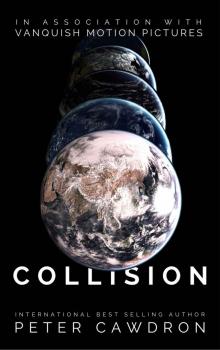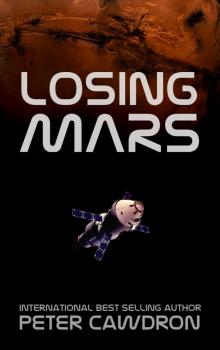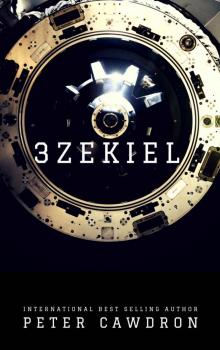- Home
- Peter Cawdron
Déjà Vu (First Contact) Page 2
Déjà Vu (First Contact) Read online
Page 2
“Tired, huh?”
MacArthur smiles from behind his crystal clear glass visor. Like me, his face looks tiny behind the smooth glass. The lights on the side of his helmet catch my eyes, causing me to squint. With thick gloved fingers, he punches a button and turns them off.
“Come on.”
I follow him into the airlock. As with everything that’s undertaken while using a tether, there are two clips required to move. The idea is, astronauts can only move one clip at a time, so switching between rungs or moving in/out of an airlock leaves no opportunity to drift away. There’s always at least one tether connected.
After shifting both of my lines, I pull myself into the airlock, with my legs drifting behind me. Spacewalks and vertigo go hand in hand. There’s no up in space. Up is an illusion. Up constantly shifts. It helps to think of up as above my helmet, but in reality, my helmet is always moving in relation to the Intrepid, giving me a distorted sense of position. Initially, the airlock was in front of me. By pulling myself inside, it’s shifted to above me. When I’m tired, little things like this can be disorienting. I shake the crazy dream from my head. I have to focus on the act of conducting ingress and get inside the Intrepid.
Mac closes the outer hatch and we wait. The pressure builds around us. There are subtle changes in our suit material as oxygen is pumped into the airlock. It’s not so much like wind hitting the suit fabric as paper crinkling in someone’s hand. The sensation is more akin to the weight of water slowly bearing down on us.
The airlock indicator switches to green. MacArthur takes off his gloves, followed by his helmet. I’m a little slower, feeling tired.
Mac isn’t happy. “I can’t even see a day’s extension working for us. It’s a mess down there in the engine bay. If the H3 leaks, they won’t have to worry about us going nova out by Jupiter.”
I remove the upper torso of my suit.
“Seems NASA may get its Fourth of July fireworks after all.”
Dark humor, but I’m being honest. Rushing safety checks to meet political deadlines is not smart.
We help each other out of our suits and water-cooled undergarments, stowing them on the side of the airlock. As much as I’m looking forward to getting some sleep, part of me is already back here in the lock, kitting up for another spacewalk. It’s difficult to unwind in orbit. There’s no clocking off at 5 pm and heading home to crash on the couch with a TV dinner. Work is always there, teasing us.
We charge our backpacks, hooking them up to the recycle unit to purge the CO2 captured during our walk. Even though it’s twenty minutes’ effort, we’re both so tired we barely talk during the process. When MacArthur finally opens the inner hatch, I feel an immense sense of relief. I’m going to grab a quick bite to eat and hit the sack. The fridge has cold turkey cuts and reconstituted mashed potato. That’ll do for dinner. I’m looking forward to slipping into a sleeping bag on the cargo deck.
Jensen greets us as we drift past the bridge.
“Everything stowed?”
MacArthur is surprisingly chirpy given how grumpy he was in the airlock. I guess he’s trying to be professional and maintain integrity. He doesn’t want to be seen as undermining the effort.
“Sure is. Ready for—”
Warning lights flash on the main instrument panel. I see them too. It’s not that an alarm is sounding that’s worrying, we get false positives all the time. The problem is they’re all flashing at once. There must be several thousand switches and flat-screen panels arranged around the cockpit. Toggle switches might seem like a relic from the Apollo-era, but they have their usefulness. There’s no dependence on computer screens, no ambiguity about position and setting. They require a definite, deliberate motion to flick, and they link directly to the various subsystems. With three primary computers constantly checking each other, there are still a few critical systems that run on entirely separate circuits, like fire suppression and life-support. It wouldn’t do for an email virus to take down our air circulation, so it’s wise to keep them physically separate. That everything is flashing at once is unheard of, even in our simulation training.
Jensen holds onto one of the railings. She speaks into the thin wireless microphone positioned by her lips.
“Houston, are you seeing this?”
“It’s the goddamn H3,” MacArthur yells as the superstructure of the Intrepid shudders. He pulls up a status monitor. “The inverter has ruptured. I told you. I fucking told you we shouldn’t push her.”
I’m still trying to process what’s happening when the craft flexes around me. Metal groans and then yells and finally screams as the Intrepid is torn apart. Outside in the darkness, there are flashes of light from further down the ship.
I reach for a handhold, only it recedes from me, drawing away at a slow but steady pace. It’s as though I’m on an escalator, being carried off down the corridor.
Rather than being sucked out into space, I’m pushed along by the rush of air swirling past me. The inner wall is just out of reach, leaving my fingers grasping at the air. I won’t be able to stop myself until I drift closer to one of the control panels.
Mac yells, “Hull breach!”
Jensen’s hair washes over her face. She loops her arm over a support rung, holding on as our atmosphere flushes out into space. I grab at a computer rack, trying to catch myself, but I can’t quite reach it. My fingers glance against the smooth steel. The last thing I hear is the sound of metal crumpling. Complete and utter silence descends. Although I’m dying, being in space is strangely peaceful.
The speed with which I’m ejected from the Intrepid is surreal. One moment, I’m within the main corridor. The next, I’m plunging into the darkness. I’ve been dragged through a gaping hole on the side of the craft. The Intrepid buckles under the force of the explosions cascading along her hull. The thin sheet metal that’s supposed to protect us from the vacuum of space is shredded by the blast.
In an instant, the air is sucked out of my lungs. My chest collapses.
I always thought of space as cold, but it’s not, at least, not initially. I’m spellbound. Fear should seize my mind, but the shock of dying in a vacuum overrides any emotion. I can’t believe what’s happening. Saliva boils within my mouth, seething and bubbling on my tongue without any sense of heat.
My eyes are insanely dry. My eyelids feel stiff and heavy. I blink. Fine grit forms in the corner of my eyes. It’s the dust and salts left behind by the evaporating moisture.
My arms and legs swell with the pressure drop. I feel bloated. My stomach is distended, protruding from beneath my tracksuit. During our training, they told us we’d have thirty to sixty seconds of useful consciousness in a hard vacuum. For me, it’s all over in under ten.
The last thing I see is flashes of light erupting from within the Intrepid as she orbits an alien world.
Dark clouds swirl within the gas giant.
The rings.
The rings surrounding the planet are beautiful.
Tens of thousands of tiny lines curve through space like scratches on the vinyl records of old. The rings look impossibly thin. It’s as though they’ve been etched onto a silicon wafer by the finest razor.
Dying is a perverse feeling. The desire for life is so strong it overwhelms reality. My mind clings to the view of the rings, trying to ignore the horror of what’s happening to me. The air has been torn from my lungs, leaving me starving for oxygen, with every cell in my body screaming for life. The heat of an alien sun scorches my face, burning my skin. Waves of pain surge through me, but the rings… In the depths of my mind, I cling to a single thought—the rings have always been beautiful.
Darkness descends as my life fades.
Intrepid
My gloved hand slides effortlessly over the hull of the Intrepid as she sits in a low Earth orbit. I feel as though I’ve been here before. Of course I have, on numerous previous orbits, and yet I can’t shake a sense of déjà vu.
An entire planet drifting by so calm
and serene beneath my boots is hypnotic, distracting me. I was just thinking about something, but what escapes me. Something beautiful—majestic. For a moment, I could have sworn we were in orbit around some other planet.
This particular spacewalk just hit eleven hours, and even though I should feel fatigued, I’m not. I feel as though it has only just begun. Swirling white clouds, deep blue seas, jagged coastlines and rugged mountains glide beneath me. Earth appears serene from up here.
The voice echoing within my helmet reminds me that a day in orbit is less than an hour long.
“Coming up on the terminator.”
Night falls fast in orbit—within seconds.
I’ve been working with a power wrench. My visor is partially down, lessening the brilliance of the sunlight reflecting off the waters of the Arabian Sea. I’m in the shadow of the craft, so I don’t need to worry about any direct glare. I raise my visor and pause, allowing the cordless drill to drift weightless in front of me. Day seven in space is coming to a close. It’s not a literal day, but rather the close of our seventh orbit during this spacewalk.
We’re somewhere over the Indian Ocean, heading toward Asia. Every so often, islands dot the calm waters, like those of the Seychelles or the Maldives. From up here, they look idyllic. A storm is forming off the coast of Sri Lanka. The Southern Ocean is covered in a fine smattering of candy-floss-like clouds. It’s crazy, but I could have sworn we just passed over Asia as I remember seeing cities at night. I thought we were already over the Pacific yet again. Damn, I’ve been out here too long.
“In four, three, two.”
Darkness collapses around me. The spotlights on my helmet come on automatically. I continue working my way along the outside of the Intrepid.
There’s something strangely familiar about my spacewalk. I trained on a mock version of the Intrepid in NASA’s neutral buoyancy tank, so I’ve learned where every access port is positioned. I even notice the little things, like the spacing and frequency of rivets on the hull. Every inch of the Intrepid is familiar, but this is different. It’s as though I’ve reached for this exact handhold in this exact way before. Strange.
“What’s the status on the cooling pumps?”
I whisper, “Still getting patchy readings,” and find myself speaking in perfect unison with MacArthur almost half a mile away down by the engines.
“Huh? That’s weird,” I say, forgetting I’m transmitting.
“Say again?” Jansen asks.
“Nothing.”
I reach an access panel for the communications array and go through my checklist. Everything looks good. I work around the scaffolding and over to a vent from the shuttle bay. The repetition we were subject to during our training makes my movement automatic, but there’s something unusual about this component. I’ve done this before, and I don’t mean while submerged in a tank on Earth. It’s not that I’m remembering the support divers swimming close by in case of an emergency. I’ve already seen this. I’m sure of it.
My scanner detects an inconsistency in the output readings from a nearby component. I want to say something about what I’ve found, but I don’t. I feel an overwhelming urge to say, “I’ve got two faulty sensors on the emergency exhaust manifold,” but I’m obstinate. I refuse to utter those words. It takes all my might to keep my lips shut. Like an itch I have to scratch, I agonize over this, fighting against those words drifting from my mouth. It would be easy, so easy to give in and let them flow, but I can’t. I won’t. Why am I suddenly so impulsive? I feel predictable. A stubborn streak within me commands defiance. I stay silent, clenching my lips tight. I’m uneasy. Something’s wrong. Something other than these goddamn sensors.
I push on, moving away from the outlet, trying to force it from my mind, unsure what’s happening to me. I don’t like this. I don’t like being compelled to do anything. I’m irrationally defiant. That was a fault. I should report it.
The radio crackles in my ear.
“Have you got something, Jess? Did you find something?”
How the hell did Jansen know?
It’s then I realize. We’re trapped on the Intrepid. How? Why? I’m not sure, but in the back of my mind, I have a vague memory of dying. I drifted out into space without a spacesuit. My thinking is irrational given I’m already in space and already wearing a spacesuit, but I feel an overwhelming sense of déjà vu.
“No. All good.” I’m lying, but I have to.
I need to figure out what’s happening to me.
I’m repulsed by the thought of dying in space and have to stave off a panic attack. I assure myself I’m okay. I’m suited up. Supplies are good. Electrical power is good. Cooling is good. Computer is good. I’m good. I’m good. And yet the notion of drifting into the depths of space is impossible to ignore. Am I developing a deep-seated fear of death? Perhaps a phobia specific to dying in a vacuum? We’re supposed to report any state changes in our mental health. Goddamn it! The shrinks are going to love this shit.
With thick, gloved fingers, I punch the details of the fault into my wrist-pad computer. For now, I surrender to that impulse. I’m trying to ground myself in the reality of the moment.
“If she was a car, she’d be recalled.”
MacArthur’s comment is out of context as I didn’t complain about anything. He’s speaking in reply to something I said, but I never spoke about the fault I found. What the hell is going on?
We’re two days out from lighting the fires and leaving Earth’s orbit. Everyone’s feeling the pressure. It’ll take six months before we’re beyond the orbit of Jupiter and able to engage the displacement drive to jump beyond light speed. Firing up the drive close to Earth is not an option. Too much energy is involved. We could irradiate the planet if the damn thing went nova, but that doesn’t bother me. My mind is bouncing between what I should be thinking about and what I want to focus on. I don’t want to think about the journey. I should, but I don’t. Something’s wrong. I can sense it.
Jansen speaks with bitterness.
“Stow it, Jess.”
“I didn’t say anything.” There’s silence on the channel. “You were waiting for me to say, we’re not ready, but I never said that.”
“Stow it, Jess.”
Something’s very wrong.
“Mac?” I say.
“Yes.”
“Deaf two awe who mons.”
MacArthur laughs. “I was just about to say that.”
“I know.”
A shudder runs down my spine.
“Say again,” is the response from Jansen.
“That’s the slogan in the Proc,” MacArthur says. He’s right on time. I mouth his next few words with perfect synchronicity. I know the exact pacing of each syllable as he continues, saying, “Death to all humans.”
Jansen is not impressed. “MacArthur, you’re not helping.”
I can’t keep quiet.
“This is wrong. Everything’s wrong.”
“I said, stow it, Jess—and I mean it.”
“No. Not the launch. I’m not talking about the Intrepid. Don’t you get it? We’re on-script. All of this. It’s happened before.”
“What have you been smoking?” MacArthur asks with a fake laugh.
“Check the drive inverter.” I’m not sure where that thought came from. I’m reacting on instinct, but I know this is important.
“Way ahead of you. Already ticked it off the list.”
“Check it again.”
“What? Why?”
“Just do it, okay? Trust me on this. Take another look.”
There’s silence on the channel for a few seconds. MacArthur is breathing heavily as he moves around.
“I don’t see anything?”
“Damn it, Mac. Check the goddamn inverter. It’s leaking H3.”
“How did you—”
The radio crackles. “Intrepid, we confirm your assessment.” It’s an incoming message from Houston, but we never provided them with an assessment. “Flight says
hold. Eight-hour rest cycle and continue. Over.”
“What the—” but I cut Jansen off, telling mission control what they want to hear.
“Copy that, Houston.”
Jansen switches channels. I can see the feed on my wrist-pad computer. She switches from the open channel to the internal intercom, accessible only by those of us on the Intrepid. MacArthur will be listening in. “What the hell is going on, Jess?”
“That’s what I’d like to know.”
“Sweet Jesus.” MacArthur never was one for subtlety. “We’re venting. I’m seeing excess Oxygen and H3. If that shit gets near the fusion core, we’re going up like fireworks.”
“How did you know?” Jansen asks.
“We’ve been here before?”
“Here?”
Here is a nebulous term in space. We’re racing around the planet at tens of thousands of miles an hour. Technically, we’ve been here several times in the last twenty-four hours. Here is rushing past us at several miles per second.
“Bring it in,” Jansen says. “I want to see both of you on the bridge.”
“Roger that,” MacArthur replies.
Neither of them get it. They’re still thinking about the political pressure we’re under to launch on time. They think this is about our safety in orbit, or perhaps our scheduled departure—it’s not. Something else is happening. I feel as though I’m on the verge of understanding what, but like a forgotten dream, the details are just out of reach.
I begin making my way toward the airlock, working hand over hand along a safety rail. The rings of the massive gas giant are spectacular. They reach out over a hundred thousand miles beyond the planet. Thin lines curl inward, shepherded by dozens of small moons. They’re fragments from some celestial collision billions of years ago. Out beyond the shadow of the planet, the rings shimmer like sterling silver. Here in the darkness, they’re wafer-thin and barely visible. Millions of strands cascade around each other in an intricate orbital dance. I blink and they’re gone. Once again, Earth glides beneath the Intrepid.

 Alien Space Tentacle Porn
Alien Space Tentacle Porn Reentry
Reentry Déjà Vu (First Contact)
Déjà Vu (First Contact) Wherever Seeds May Fall (First Contact)
Wherever Seeds May Fall (First Contact) But The Stars
But The Stars Trixie & Me
Trixie & Me Collision
Collision Jury Duty (First Contact)
Jury Duty (First Contact) Losing Mars
Losing Mars We Are Legion (van Helsing Diaries Book 2)
We Are Legion (van Helsing Diaries Book 2) Van Helsing's Diaries (Books 1-3): Nosferatu
Van Helsing's Diaries (Books 1-3): Nosferatu Shadows
Shadows 3zekiel (First Contact)
3zekiel (First Contact) Vampire (van Helsing Diaries Book 1)
Vampire (van Helsing Diaries Book 1) Xenophobia
Xenophobia All Our Tomorrows
All Our Tomorrows My Sweet Satan
My Sweet Satan Anomaly
Anomaly Monsters
Monsters